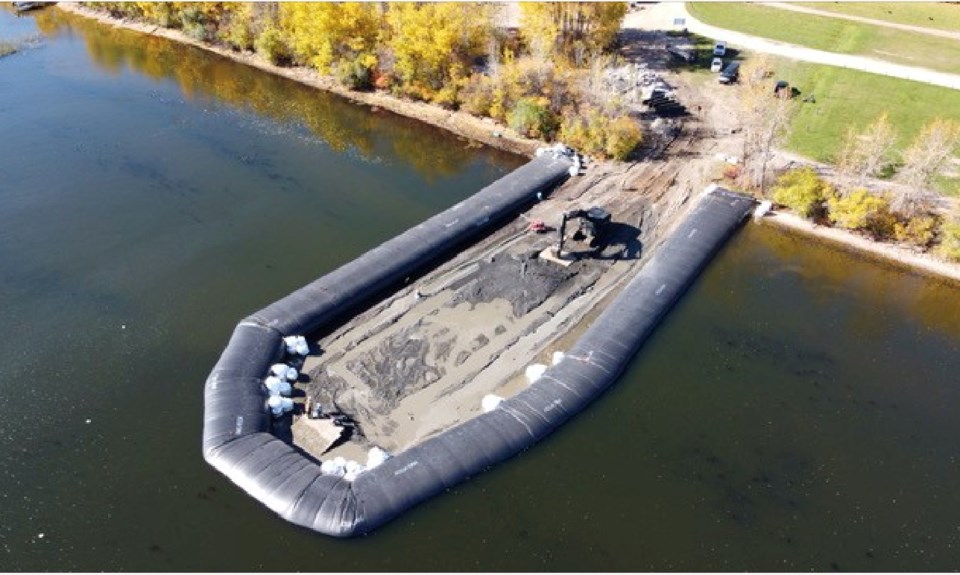LAC LA BICHE - An archeological excavation continues along Campsite Road north of Plamondon on land where Lac La Biche County has been planning to build a boat launch with accompanying amenities.
The spot was chosen for the project last year, mainly due to the grounds ability to sustain development. Most areas along the north portion of the lake have loose sediment that makes construction challenging, according to initial findings by Gary Harman, the County's manager of Parks and Facilities.
Before construction was set to begin on a new boat launch and paved parking lot to replace the one removed from the White Sands Resort a few kilometres away, County officials were informed that site fell under a provincially marked “Historical Cabin Site,” after a large archeological survey was carried out in the area in 1975.
Old cabins
The location of three post-1900s cabins were subsequently added to the provincial database for future archeological exploration. The site was left dormant until the County requested permission from the province to develop the land, which prompted the excavation process.
The regional archaeologist who oversees historical resources in Lac La Biche County, Caroline Hudecek-Cuffe, remembers when the boat launch development project crossed her desk a few years ago. She recommended the site have further surveying carried out.
“I saw that it was located in an area within the polygon, or the defined boundary, of a previously recorded site that hadn't been revisited since 1975... Because the development was going to include grading, stripping and putting in a road and a parking lot, it was going to destroy the sediments,” Hudecek-Cuffe explained.
“Archaeological sites along lakeshores like this are usually quite close to the surface. We knew that the development was going to impact any buried archaeological material.”
According to Hudecek-Cuffe there are approximately 40,000 sites across Alberta have been similarly earmarked as potential archeological sites. The list exceeds the capacity for all flagged sites to be excavated, so sites are often left undisturbed until a development project threatens to unearth historical resources, as in the case of the newCampsite Road boat launch.
Leaving historically-relevant sites intact is a preferred method of preserving artifacts whether they are cultural, historical or paleontological, Hudecek-Cuffe say, simply explaining that if they are avoided, they are preserved.
“Our philosophy is that we want to avoid and protect archaeological sites as much as we can because these are non-renewable resources. Once they're destroyed or lost, they're lost forever,” she told Lakeland Today.
More time and money needed
Hudecek-Cuffe says the land can be used for development but because the location selected was previously identified as a historical site, the area must undergo further assessment by a certified archeologist in order to properly excavate and search for any relevant artifacts that may be lying beneath the surface.
Lac La Biche County has contracted a certified consultant to carry out the excavation, costing the municipality time and roughly $20,000, in order to carry out the provincially mandated impact assessment.
Based on the findings presented to the province by the archeological consultant once the excavation is complete, the site will either be approved for development or a stage two archaeological process could take effect. A stage two scenario would require further excavation and greater exploration of the surrounding area to ensure no historical resources are lost.
Once the project is permitted to proceed by the province’s Historical Management Branch, additional funds will to be spent in order construct the anticipated boat launch.
Currently, there is no date from the Lac La Biche County for when the stage one impact assessment is expected to wrap up and be submitted for review by the province.
More discoveries at Campsite Road
Initial subsurface testing at the site has revealed bullet casings and wire-pulled nails among many other artifacts dating back to the early 1900s, which are considered to be connected to early trade expeditions, Hudecek-Cuffe says.
Research at the same site has also unearthed evidence of a pre-contact Indigenous settlement.
“It's not uncommon to find sites and locations where people repeatedly come back over and over again, for similar reasons... They had the same reasons for camping there as we do nowadays, because they are nice locations along the lakes,” she says. Adding it is the same reason the location was selected for a boat launch, it’s a perfect spot.
So far, the Campsite Road excavation has also unearthed arrowheads, scrapers, stoned formed tools, broken fire rocks, calcite bone fragments and preserved fish bones. These artifacts were likely used between 300 to 800 years ago, but will be assessed at the Royal Alberta Museum for further analysis and documentation, Hudecek-Cuffe says.
For some, the findings may not be as exciting as dinosaur bones, she admits, but it does give residents and experts an understanding of how the land was used and how Indigenous peoples lived over the last number of centuries.
“It's important that these stories get shared, because it is an important part of the landscape — it’s important part of Alberta. People were here 10,000 years before white settlers got here and they were doing some amazing things,” said Hudecek-Cuffe.
“It's important that we protect these resources while there still here.”
Again, timeframes on when reports will be presented are not known. Prior to the most recent findings and reporting, municipal officials had hoped to have the Campsite Road boat launch operating by the autumn months this year.
The nearest boat launch for residents north of Plamondon continues to be the recently upgraded Poplar Point boat launch about 25 kilometres from the Campsite Road location. Another new boat launch on the Old Plamondon Trail is about the same distance away.



